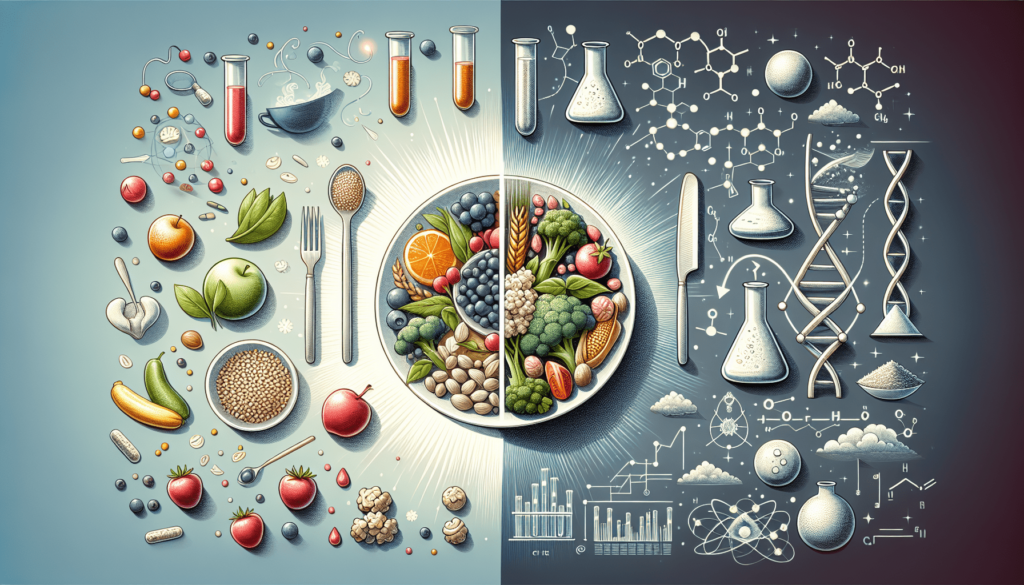Did you ever wonder if there is any scientific evidence to support the claims about functional foods? Well, you’re not alone. With the increasing popularity of functional foods, it’s natural to question their actual benefits. In this article, we will explore whether any scientific studies have been conducted to back the claims of functional foods. So, sit back, relax, and let’s dig deeper into the fascinating world of functional foods and their potential to improve our health.

Introduction to functional foods
Functional foods are a category of food products that provide additional health benefits beyond basic nutrition. While all foods provide essential nutrients for our bodies, functional foods go a step further by offering specific components that can promote good health and prevent diseases. These foods have gained popularity in recent years due to their potential to optimize our well-being and help us lead a healthier lifestyle. In this article, we will explore the definition, characteristics, and various types of functional foods, along with their role in disease prevention. We will also delve into scientific studies that support the benefits of functional foods, focusing on their impact on cardiovascular health, cancer prevention, diabetes management, digestive health, and brain function.
Definition and characteristics of functional foods
Functional foods can be defined as food products that contain certain nutrients, bioactive compounds, or other components that go beyond basic nutrition and contribute to promoting health or reducing the risk of diseases. These foods are often enriched with specific vitamins, minerals, antioxidants, phytochemicals, or probiotics to offer superior health benefits. Unlike regular foods, functional foods are intentionally formulated or modified to enhance their positive impact on our well-being. They are designed to target specific health needs and can be consumed as part of a balanced diet for overall improved health.
The key characteristics of functional foods include their ability to:
-
Provide essential nutrients: Functional foods are rich in vital nutrients that our bodies require for optimal functioning. Whether it’s vitamins, minerals, proteins, or other essential components, these foods deliver the necessary nourishment.
-
Offer additional health benefits: In addition to providing essential nutrients, functional foods contain bioactive compounds and other components that offer various health benefits such as improved digestion, enhanced immune function, reduced inflammation, and increased energy.
-
Target specific health concerns: Functional foods are often developed to address specific health concerns or conditions. They are formulated with ingredients that target certain physiological functions and help prevent or manage diseases.
-
Be part of a balanced diet: Functional foods are meant to be incorporated into a balanced diet that includes a variety of other nutritious foods. They are not intended to replace other essential food groups but rather complement them for overall health improvement.

Types of functional foods
There are several types of functional foods available, each offering unique health benefits. Let’s explore some of the most common categories:
Fruits and vegetables
Fruits and vegetables are renowned for their nutritional value, but they also qualify as functional foods due to their high antioxidant content, fiber, and phytochemicals. Antioxidants in fruits and vegetables help protect our cells from damage caused by harmful free radicals, reduce inflammation, and promote overall well-being.
Whole grains
Whole grains, such as brown rice, oats, quinoa, and whole wheat, contain all parts of the grain, including the bran, germ, and endosperm. This makes them rich in fiber, B vitamins, minerals, and phytochemicals. The fiber present in whole grains promotes healthy digestion, helps regulate blood sugar levels, and lowers the risk of heart disease and certain types of cancer.
Probiotics and fermented foods
Probiotics are beneficial bacteria that promote gut health and aid in digestion. They are present in foods like yogurt, kefir, sauerkraut, kimchi, and pickles. Consuming these probiotic-rich foods helps maintain a healthy balance of gut bacteria, improves digestion, strengthens the immune system, and may also alleviate certain digestive disorders.
Fish and omega-3 fatty acids
Fish, particularly fatty fish like salmon, trout, and sardines, are excellent sources of omega-3 fatty acids. Omega-3 fatty acids are essential for brain health, reducing inflammation, lowering the risk of heart disease, and promoting healthy skin. They have also been associated with improved cognitive function and reduced symptoms of depression.
Herbs and spices
Herbs and spices not only add flavor to our meals but also offer numerous health benefits. For example, turmeric contains the powerful antioxidant curcumin, which has anti-inflammatory properties and may help prevent chronic diseases. Ginger is known to aid digestion and reduce nausea, while garlic and onions have antimicrobial properties that support a healthy immune system.
Role of functional foods in disease prevention
Functional foods play a significant role in disease prevention due to their unique composition and health-promoting properties. Let’s explore some of the key benefits of functional foods in preventing various diseases:
Cardiovascular diseases
Cardiovascular diseases, including heart disease and stroke, are leading causes of death worldwide. Functional foods can contribute to reducing the risk of these diseases by:
-
Lowering blood pressure: Several functional foods, such as fruits, vegetables, and whole grains, are rich in potassium and fiber, which help regulate blood pressure and maintain a healthy heart.
-
Managing cholesterol levels: Certain functional foods, like oatmeal and walnuts, contain soluble fiber and healthy fats that can help lower LDL (bad) cholesterol levels and improve overall lipid profiles.
-
Decreasing inflammation: The antioxidants and phytochemicals in functional foods, particularly those found in fruits, vegetables, and omega-3 fatty acids, have anti-inflammatory properties that can protect blood vessels and reduce the risk of heart disease.
Cancer
Cancer is a complex disease, but functional foods have been found to have a protective effect against certain types of cancer. Functional foods aid in cancer prevention by:
-
Providing antioxidant support: Antioxidants present in fruits, vegetables, herbs, and spices neutralize harmful free radicals and help prevent DNA damage, reducing the risk of cell mutations that can lead to cancer.
-
Supporting the immune system: Functional foods rich in vitamins, minerals, and phytochemicals help strengthen the immune system, promoting the body’s ability to fight off cancer cells.
-
Offering anti-inflammatory properties: Chronic inflammation is linked to an increased risk of cancer. Functional foods with anti-inflammatory properties can help reduce inflammation and lower the risk of cancer development.
Diabetes
Functional foods can also play a crucial role in managing and preventing type 2 diabetes. These foods contribute to diabetes prevention by:
-
Controlling blood sugar levels: Whole grains, legumes, and certain fruits and vegetables contain fiber, which slows down the absorption of sugar into the bloodstream, helping to stabilize blood sugar levels.
-
Improving insulin sensitivity: Probiotics, found in yogurt and other fermented foods, may improve insulin sensitivity and help regulate blood sugar levels in individuals with diabetes.
-
Providing antioxidant support: Antioxidants present in functional foods can help protect pancreatic beta cells, which produce insulin, from oxidative stress and damage.
Digestive health
Functional foods are well-known for their positive impact on digestive health. They promote healthy digestion by:
-
Supporting gut microbiota: Probiotics and fermented foods help maintain the balance of beneficial bacteria in the gut, which aids in digestion, nutrient absorption, and overall gut health.
-
Providing fiber for regularity: Foods rich in fiber, such as whole grains, fruits, vegetables, and legumes, add bulk to the stool, facilitating regular bowel movements and preventing constipation.
-
Alleviating digestive disorders: Certain functional foods, like ginger and peppermint, have been traditionally used to alleviate symptoms of digestive disorders such as indigestion, bloating, and nausea.
Brain health
Functional foods can also have a positive impact on brain health and cognitive function. They enhance brain health by:
-
Providing essential nutrients: Functional foods rich in vitamins, minerals, omega-3 fatty acids, and antioxidants supply the brain with the necessary nutrients for optimal function and may help protect against age-related cognitive decline.
-
Reducing inflammation: Chronic inflammation has been linked to cognitive decline and neurodegenerative diseases. Functional foods with anti-inflammatory properties, like berries and fatty fish, can help reduce inflammation in the brain.
-
Promoting healthy blood flow: Certain functional foods, such as dark chocolate and blueberries, contain compounds that improve blood flow to the brain, enhancing cognitive function and memory.
In the next sections, we will explore scientific studies that support the benefits of functional foods in the prevention and management of various diseases.
